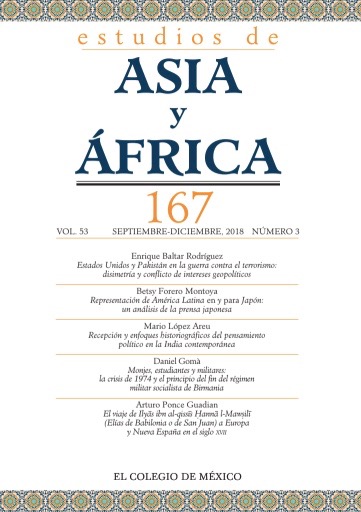Abstract
Contemporary political theory is dominated by the ideas and values of modern Western thought, however, following the decolonisation process in Asia and Africa an important debate is taking place regarding the continuity and legitimacy of those ideas in postcolonial societies. This paper analyses that debate within Indian political science, on how Western ideas have interacted with those in the Indian tradition to shape the present modern Indian political thought and the contemporary Indian state. The paper presents the main historiographical approaches present in this debate through an analysis of their main authors and works: the hermeneutic approach, which defends that modern Indian political thought is the result of a process of encounter between Western and Indian traditions, and the indigenist approach, which advocates for the development of an Indian political science discipline autonomous of Western ideas and values.References
Bayly, C. (1996). Empire and information: intelligence gathering and social communication in India (1780-1870). Cambridge: Cambridge University Press.
Bayly, C. Afterword. En S. Kapila (Ed.), An intellectual history for India. Cambridge: Cambridge University Press.
Bayly, C. (2012). Recovering liberties: Indian thought in the age of liberalism and empire. Cambridge: Cambridge University Press.
Bhandarkar, D. R. (1929). Some aspects of ancient Hindu polity. Benarés: Banaras Hindu University.
Bhattacharya, K. C. (1954). Swaraj in ideas. Visvabharati Quarterly, 20, 103-114.
Chatterjee, P. (1986). Nationalist thought and the colonial world: a derivative discourse. Londres: Zed Books.
Chatterjee, P. (1996). Whose imagined communities?. En G. Balakrishnan (Ed.), Mapping the nation. Londres: Verso.
Dandekar, R. N. (1998). Artha: the second end of man. En A. T. Einbree (Ed.), Sources of Indian tradition, vol. I. Nueva York: Columbia University Press.
Datta, P, K. y Palshikar, S. (2013). Indian political thought. Nueva Delhi: Oxford University Press.
Das, V. (1989). Subaltern as a perspective. En R. Guha (Ed.), Subaltern Studies VI: writings on South Asian history and society. Nueva Delhi: Oxford University Press.
Dumont, L. (1980). Homo Hierarchicus: the caste system and its implications. Chicago: Chicago University Press.
Gramsci, A. (2003). Selections from the prison notebooks. Londres: Lawrence and Wishart.
Gramsci, A. (2007). Quaderni de la carcere, vol. VI. Turín: Instituto Gramsci.
Guha, R. (1982). On some aspects of the historiography of colonial India. En R. Guha (Ed.), Subaltern Studies I: writings on South Asia history and society. Nueva Delhi: Oxford University Press.
Guha, R. (1983). Elementary aspects of peasant insurgency in colonial India. Durham: Duke University Press.
Guha, R. (1989). Dominance without hegemony and its historiography. En R. Guha (Ed.), Subaltern Studies VI: writings on South Asia history and society. Nueva Delhi: Oxford University Press.
Heesterman, J. (1985). The inner conflict of tradition: essays in Indian ritual, kinship and society. Chicago: Chicago University Press.
Hobsbawm, E. (1971). Primitive rebels: studies in archaic forms of social movement in the 19th and 20th centuries. Manchester: Manchester University Press.
Jayaswal, K. (2005). Hindu polity: a constitutional history of India in Hindu times. Nueva Delhi: Chaukhamba Sanskrit Pratishthan.
Joseph, S. (1991). Indigenous social science project: some political implications. Economic and Political Weekly, 26(15), 959-963.
Kapila, S. (Ed.) (2011). An intellectual history for India. Cambridge: Cambridge University Press.
Kaviraj, S. (1997a). Politics in India. Nueva Delhi: Oxford University Press.
Kaviraj, S. (1997b). The modern state in India. En M. Doornbos y S. Kaviraj (Eds.), Dynamics of state formation: India and Europe compared. Nueva Delhi: Sage.
Kaviraj, S. (2010). The imaginary institution of India. Nueva York: Columbia University Press.
Khilnani, S. (1997) The idea of India. Nueva Delhi: Penguin.
Mehta, V. R. (1992). Foundations of Indian political thought. Nueva Delhi: Manohar.
Nandy, A. (1983). The intimate enemy: loss and recovery of self under colonialism. Nueva Delhi: Oxford University Press.
Pantham, T. (1986). Introduction: for the study of modern Indian political thought. En T. Pantham y K. Deutsch (Eds.), Modern Indian political thought. Nueva Delhi: Sage.
Parekh, B. (1986). Some reflections on the Hindu tradition of political thought. En T. Pantham y K. Deutsch (Eds.), Modern Indian political thought. Nueva Delhi: Sage.
Pinch, W. (1991). Same difference in India and Europe. History and Theory, 38(3), 389-407.
Kumar Sarkar, B. (1939). The political institutions and theories of the Hindus: a study in comparative politics. Calcuta: Chuckervertty, Chatterjee & Co.
Singha, R. (1998). Civil authority and due process: colonial criminal justice in the Banaras zamindari, 1781-1795. En M. Anderson y S. Guha (Eds.), Changing concepts of rights and justice in South Asia. Nueva Delhi: Oxford University Press.
Vajpeyi, A. (2013). Righteous republic: the political foundations of modern India. Cambridge, Mass.: Harvard University Press.
This work is licensed under a Creative Commons Attribution-NonCommercial-NoDerivatives 4.0 International License
Copyright 2022 Estudios de Asia y África


